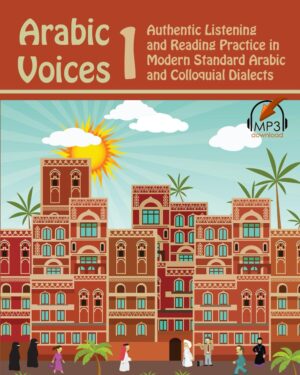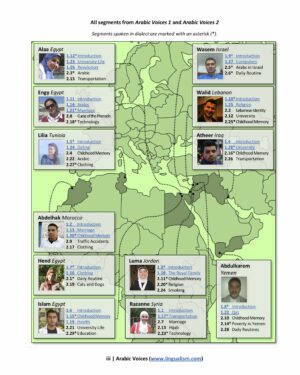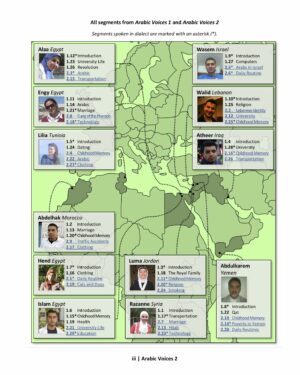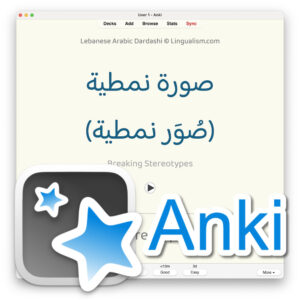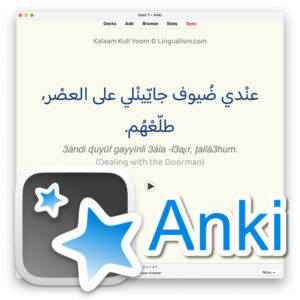Home » Modern Standard Arabic » Childhood Memory-Lilia
Childhood Memory-Lilia
| Greetings and welcome! [00:00.2] | السلام عليكم ورحمة الله وبركاته، أهلًا ومرحبًا بكم. | |
| In this video, we will talk about what Lilia had to say about her childhood, and the experience she went through. [00:05.4] | في هذا الفيديو سنتحدّث عمّا قالته ليليا بشأن طفولتها، والتجربة التي مرت بها. | |
| So let's start on page 19, and start specifically on line 1 where Lilia says, "I remember once when I was young, I was about twelve years old at the time," [00:13.3] | فهيّا بنا نبدأ في الصفحة التاسعة عشر، ونبدأ تحديدًا في السطر الأول حيث تقول ليليا: (أذكر مرة وأنا صغيرة، عمري آنذاك كان حوالي اثنا عشر سنة)، | |
| Lilya uses the word آنذاك (then) here, and this word refers to a specific time. [00:28.4] | تستخدم ليليا هنا كلمة [آنذاك]، وهذه الكلمة تشير إلى وقتٍ محدد. | |
| For example, you can say, “When I went to college I was eighteen years old.” When you use آنذاك, you are referring to a specific period or time. [00:35.2] | فيمكنك أن تقول مثلًا: (عندما ذهبت إلى الجامعة كان عمري آنذاك ثمانية عشر عامًا)، وعندما تستخدم [آنذاك] فأنت تشير إلى مدة أو إلى وقتٍ محدد. | |
| You can also use the phrase في ذاك الوقت. For example, in this example Lilia says, "I remember once when I was young at the time, it was about twelve years old," آنذاك or في ذاك الوقت, you can use either of them. [00:51.4] | يمكنك كذلك أن تستخدم كلمة [في ذاك الوقت… في ذاك الوقت]، مثلًا في هذا المثال تقول ليليا: (أذكر مرة وأنا صغيرة عمري في ذاك الوقت كان حوالي اثنا عشر سنة)، [آنذاك] أو [في ذاك الوقت]، يمكنك استخدام أيًا منهما. | |
| On line 3, Lilia says, "He had received an attractive offer to work there for four years," and we often use the word مغري (offer) or the phrase عرض مغري (attractive offer) in Arabic, which means that there was… there was a very good offer so her father accepted the job. [01:16.6] | في السطر الثالث تقول ليليا: (فقد تلقى عرضًا مغريًا للعمل هنالك لمدة أربع سنوات)، وكثيرًا ما نستخدم كلمة [عرض] أو عبارة [عرض مغري] في اللغة العربية، وهذا يعني أن هناك… كان هناك عرض جيد جدًا لذلك قَبَل والدها العمل. | |
| You could say, "I bought the house because it was a very attractive offer." That is to say, a very good offer. [01:42.4] | يمكنك أن تقول: (اشتريت البيت لأنه كان عرضًا مغريًا)، عرضًا مغريًا أي أنه عرض جيد جدًا. | |
| After that, we move to line 7, where Lilia says, "I even thought she was joking with me," and here Lilia uses the verb خِلْت which means 'I thought,' and this verb is... that is, it is used in Classical Arabic, "I thought something" that is, "I thought something." [01:55.5] | بعد ذلك ننتقل إلى السطر السابع، حيث تقول ليليا: (حتى إني خِلْتُها تمزح معي)، وهنا تستخدم ليليا الفعل [خِلْت] وهو بمعنى ظننت… بمعنى [ظننت]، وهذا الفعل يكون… يعني يستخدم في العربية الفصحى، [خِلْت شيء] أي [ظننت شيئًا ما]. | |
| You can say, "I thought he wanted to talk to me," that is, "I thought he wanted to talk to me," both of them have the same meaning. [02:20.88] | يمكنك أن تقول: (خِلْته يريد التحدّث معي)، أي (ظننته يريد التحدّث معي)، كلاهما بمعنّا واحد. | |
| On line 11, Lilia says, "I was very attached to my friends, my family, my school, my city, my neighborhood, and even my country Tunisia," and you see here how بـ has been repeated before each of the names Lilia used. [02:31.6] | في السطر الحادي عشر تقول ليليا: (لقد كنت شديدة التعلّق بأصدقائي، بعائلتي، بمدرستي، وبمدينتي، بحارتي، بل وبتونس بلدي)، وترى هنا كيف قد تكررت [الباء] قبل كل من الأسماء التي استخدمتها ليليا. | |
| When using the verb يتعلّق (to relate), we often attach it to بـ, so we say, "So-and-so relates to something, I am attached to my country, I am related to my country," whether you use the verb or any of the different adjectives or infinitives, you attach it to the preposition بـ. [02:57.1] | فعند استخدام الفعل [يتعلّق] غالبًا ما نلحقه بحرف [الباء]، فنقول: (يتعلّق فلان بشيء ما، أنا أتعلّق ببلدي، أنا متعلّق ببلدي)، سواءً ما استخدمت الفعل أو أي من الصفات المختلفة الصفة أو المصدر فتلحقه بحرف الباء. | |
| I am attached to my friends," that is, I love them very much, and I do not want to leave them. "I am attached to my country," and so on. [03:22.9] | (أنا متعلّق بأصدقائي)، أي إنني أحبهم جدًا، ولا أريد أن أتركهم، (أنا متعلّق ببلدي)، وهكذا. | |
| After that, we move to line 13, where Lilia says, "I remember how much I cried that night, and how sad," and here Lilia uses the word كم (how much) for amounts… to emphasize, she says, "l… not only did I cry, but how much I cried that night, and how sad I was." [03:33.4] | بعد ذلك ننتقل إلى السطر الثالث عشر، حيث تقول ليليا: (أذكر كم بكيت تلك الليلة، وكم حزنت)، وهنا تستخدم ليليا كلمة [كم] للمبالغ… للمبالغة فهي تقول أنا ل… لم أبكي فقط، ولكن كم بكيت تلك الليلة، وكم حزنت. | |
| And when you use كم before a verb, you can use this form to emphasize, to say that something happened to a great extent, "how sad," "how we cried." [03:57.6] | وعندما تستخدم [كم] قبل الفعل، يمكنك أن تستخدم هذه الصيغة للمبالغة، للقول بأن شيئًا قد حدث إلى حدٍ كبير، (كم حزنت، كم بكيت). | |
| For example, you can say, "How many countries I havev seen!" If you have traveled in your life to many countries, then you can say, "How many countries I have seen," meaning that you have seen… have seen many countries. [04:13.6] | فيمكنك أن تقول مثلًا: (كم رأيت من بلاد)، إن كنت قد سافرت في حياتك إلى بلادٍ كثيرة، فيمكنك أن تقول: (كم رأيت من بلاد) أي أنك قد رأي… قد رأيت بلادًا كثيرة جدًا. | |
| When كم is used before the verb here, it means to emphasize that something very much happened. "How I cried that night," "how sad!" [04:30.5] | فعند استخدام [كم] قبل [الفعل] هنا، فهذا يعني المبالغة أن أمر قد حدث إلى حد كبير (كم بكيت تلك الليلة، وكم حزنت). | |
| Great! We then move on to line 15, and we only want to refer here to the use of آنذاك (then) in a context, in a word, or in another sentence. [04:42.9] | عظيم ! ننتقل بعد ذلك إلى السطر الخامس عشر، ونريد فقط الإشارة هنا إلى استخدام [آنذاك] في سياقٍ، في كلمةٍ، أو في جملةٍ أخرى. | |
| Lilia says here, "I was at the end of my first year at that time," that is, "I was at that time at the end of my first year," it refers here to a specific time and we explained this at the beginning of the video. [04:56.5] | تقول ليليا هنا: (كنت آنذاك في نهاية سنتي الأولى)، أي (كنت في ذاك الوقت في نهاية سنتي الأولى)، فهي تشير هنا إلى وقتٍ محدد وكنا قد شرحنا هذا في بداية الفيديو. | |
| On line 28, Lilia says, "And I refused to talk to everyone, I refused to integrate into school, and I also suffer from insomnia," so Lilia here uses the verb يعاني (suffers). [05:14.2] | في السطر الثامن والعشرون تقول ليليا: (ورفضت الحديث مع الجميع، رفضت الإندماج في المدرسة، وأصبحت أعاني من الأرق كذلك)، فتستخدم ليليا هنا الفعل [يعاني]. | |
| And when you use the verb يعاني, you add it to the preposition من, so you say, "I am suffering from something, I am suffering from disease." We ask God for you safety. [05:31.9] | وعند استخدام الفعل [يعاني]، تلحقه بحرف الجر [من]، فتقول: (أنا أعاني من أمر ما، أنا أعاني من المرض)—نسأل الله لكم السلامة— | |
| I am suffering from disease," meaning that you mean sick, and this is a difficult matter for you, so you suffer from sickness. We ask God to keep you safe. This is just to explain. [05:46.6] | (أنا أعاني من المرض) أي أنك يعني مريض، وهذا أمر شاقٌ عليك فتعاني من المرض—نسأل الله لك السلامة—هذا فقط للشرح. | |
| You can also say that you suffer from something that is not specifically a disease, but you can say, "You suffer from something else," that is something that is difficult. [06:00.1] | ويمكنك أن تقول كذلك معاناة من أمرٍ ليس تحديدًا المرض، ولكن يمكنك أن تقول: (أنك تعاني من أمرٍ آخر) هو أمرٌ هو أمرٌ شاق. | |
| You can say, "I suffer from the hardship of living...from hardship of living," meaning that there is not... that is, there is not enough money to live, so he suffers from something. [06:14.2] | فيمكنك أن تقول: (أنا أعاني من ضيق العيش… من ضيق العيش) أي أن ليس… أي أنه ليس هناك مال كاف للحياة، [فيعاني من أمرٍ ما]. | |
| Then we move on line 35, where Lilia says, "But I was fully aware that it was much easier for me to leave than to… than to leave). [06:28.5] | بعد ذلك ننتقل إلى السطر الخامس والثلاثون، حيث تقول ليليا: (ولكني كنت واعيةً تمام الوعي أن ذلك كان أيسر عليّ بكثير من أن أرحل إلى من أن… من أن أرحل). | |
| Here we want to comment on the word … on a phrase that Lilia used, which is the phrase واعيةً تمام الوعي, and here Lilia uses this phrase to emphasize. [06:46.2] | فهنا نريد التعليق على كلمة… على عبارة استخدمتها ليليا وهي عبارة [واعيةً تمام الوعي]، وهنا تستخدم ليليا هذه العبارة للتأكيد. | |
| She says, "I was fully conscious," meaning that she is fully conscious, very conscious, and we use this phrase a lot, for example, "I was fully conscious that I was right." [07:00.6] | هي تقول: (أنا كنت واعيةً تمام الوعي) أي إنها على وعيٍ تام، على وعيٍ شديد، ونستخدم هذه العبارة كثيرًا، نقول مثلًا: (أنا كنت واعيًا تمام الوعي بأنني على حق). | |
| You can also say, "I know perfectly, I know perfectly, I am absolutely certain," and so on, and this is for certainty and confirmation. [07:15.7] | يمكنك أن تقول كذلك: (أنا أعرف تمام المعرفة، أنا أعلم تمام العلم، أنا متأكد تمام التأكد)، وهكذا، وهذا للجزم والتأكيد. | |
| For example, you can say, "I know perfectly well that what I am doing is the truth," here you are using تمام and the masdar afterwards to verify and confirm something. [07:31.85] | يمكنك أن تقول مثلًا: (أنا أعلم تمام العلم أن ما أفعله هو الحق)، فهنا أنت تستخدم [تمام] و[المصدر] بعدها للتحقيق والتأكيد على شيءٍ ما. | |
| Great! We then move on to line 38, where Lilia says, "Now I am convinced that I can never give up my country, and what I am accustomed to here at all." [07:53.2] | عظيم! ننتقل بعد ذلك إلى السطر الثامن والثلاثون، حيث تقول ليليا: (والآن أنا مقتنعة أنه ليس بإمكاني التخلي عن بلدي، وعما إعتدت عليه هنا أبدًا). | |
| Here Lilia uses the verb يتخلى (to give up) and when using the verb, you must add it to the preposition عن, so she says, "I will not give up my country," meaning I will not leave my country. [08:12.7] | وتستخدم هنا ليليا الفعل [يتخلى]، وعند استخدام الفعل [يتخلى] فلابدّ وأن تلحقه بحرف الجر [عن]، فتقول: (أنا لن أتخلى عن بلدي)، أي أنا لن أترك بلدي. | |
| يتخلى (abandons) in the sense of 'leaves,' especially in the sense of abandonment, and we use with this verb عن, so we say, "one gives up something: I will not abandon my companions, I will not abandon my country." [08:30.1] | [يتخلى] بمعنى [يترك]، وخاصةً بمعنى الهجر، ونستخدم مع هذا الفعل [عن] فنقول: (يتخلى عن أمرٍ ما: أنا لن أتخلى عن أصحابي، لن أتخلى عن بلدي). | |
| And in the same way, on line 42, in the last line—"Lilia says: 'But I simply rejected her, for nothing, but I just can't be away from my loved ones,' [08:47.0] | وبنفس الطريقة في السطر الثاني والأربعون، في السطر الأخير—تقول ليليا: (ولكني بكل بساطة رفضتها، لا لشيءٍ ولكني فقط لا أستطيع الابتعاد عن أحبتي)، | |
| Likewise, when using the verb يبتعد عن or rather the verb يبتعد, you must use عن with this verb or from any form of this verb, whether the infinitive or otherwise. [09:05.5] | كذلك عند استخدام الفعل [يبتعد عن] أو الفعل [يبتعد] فلابدّ أن تستخدم [عن] مع هذا الفعل أو من أي صيغة من هذا الفعل، سواء المصدر أو غيره. | |
| Here Lilia says, "I can't get away from my loved ones; I don't want to be far from my country," we use عن (from) with this verb as well. [09:18.9] | فهنا تقول ليليا: (لا أستطيع الابتعاد عن أحبتي، أنا لا أريد أن أبتعد عن بلدي)، فنستخدم [عن] مع هذا الفعل أيضًا. | |
| With this, we have finished commenting on what Lilia said about her childhood, and we have explained the uses of different phrases. I will meet you in another video, God willing. [09:32.4] | وبهذا نكون قد انتهينا من التعليق عمّا قالته ليليا بشأن طفولتها، وشرحنا استخدامات لعبارات مختلفة، ألقاكم في فيديو آخر إن شاء الله. | |
| I hope you have benefited from this video. [09:46.2] | أتمنى أن تكونوا قد استفدتم من هذا الفيديو. | |
| Thank you very much. May the peace, mercy and blessings of God be upon you. [09:48.7] | أشكركم شكرًا جزيلًا، والسلام عليكم ورحمة الله وبركاته. |
Video Lessons
Arabic Voices MSA Lessons
Arabic teacher Mostafa Ahmed takes us through segments in MSA from Lingualism's book Arabic Voices 1: Authentic Listening and Reading Practice in Modern Standard Arabic and Colloquial Dialects, explaining interesting points of grammar and vocabulary.
© 2024 Lingualism LLC

